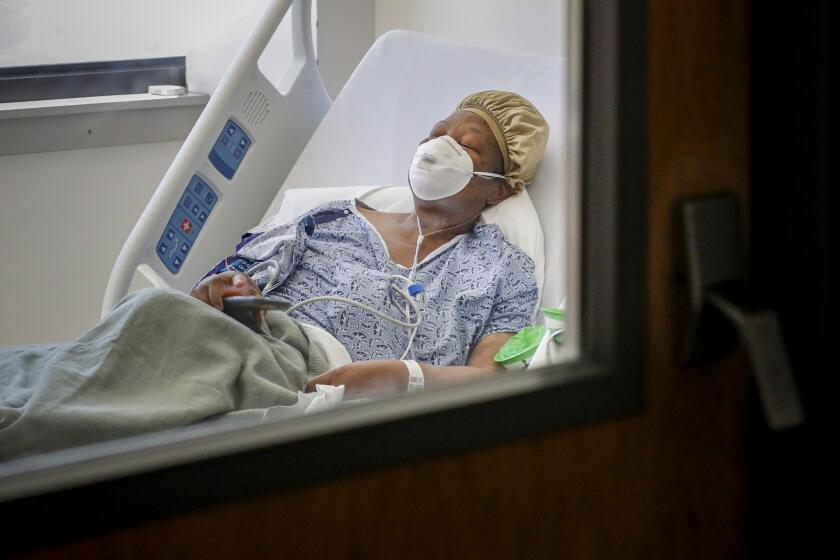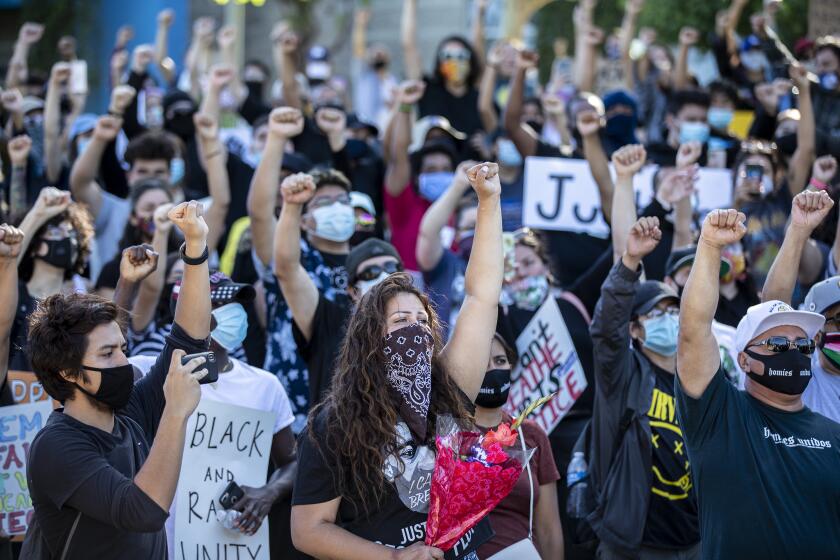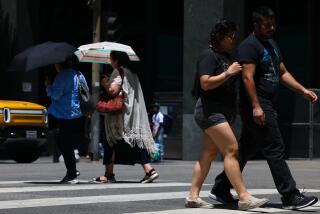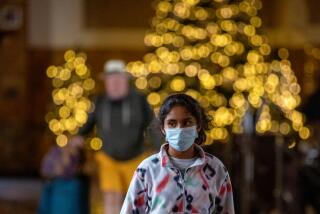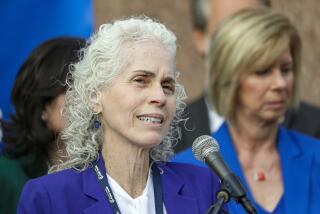Despite coronavirus, these experts support the protests for health reasons
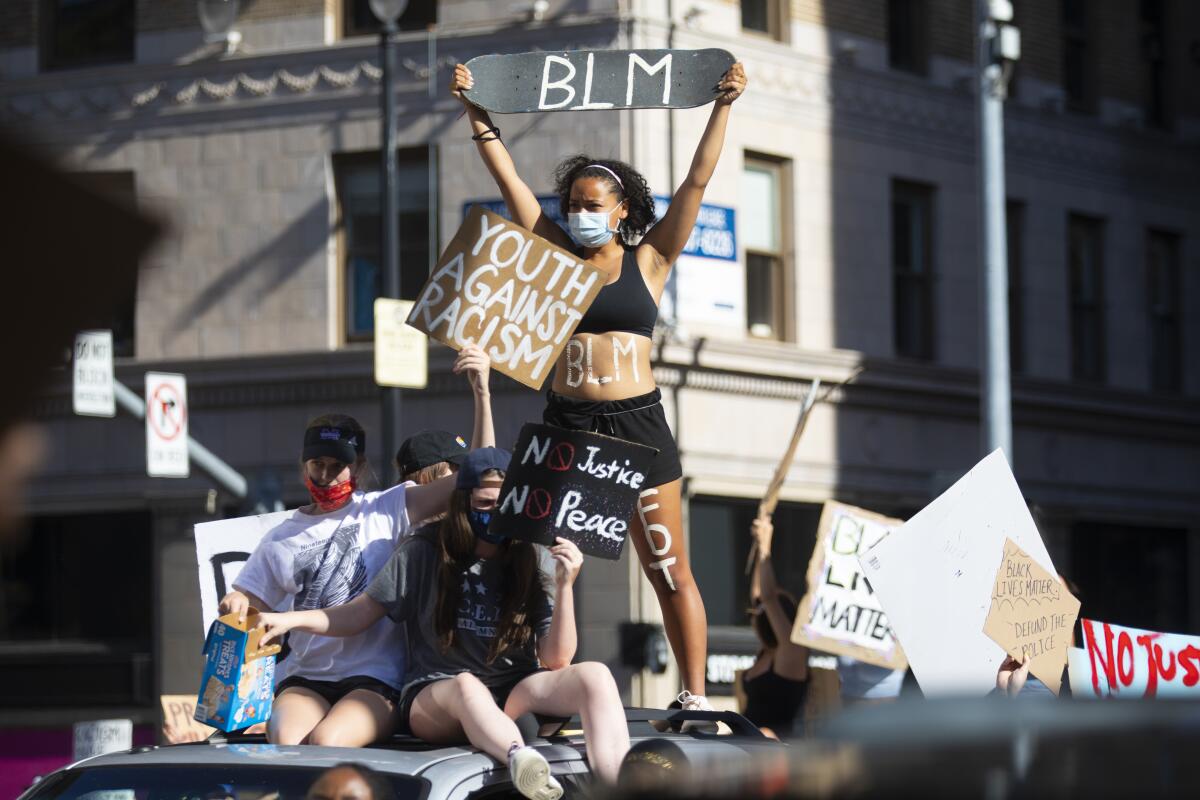
- Share via
Any type of large gathering brings a risk of spreading the coronavirus. Yet a number of health experts are supporting protests being held nationwide in response to the death of George Floyd.
Why is that?
Many health experts note that racism is the root cause of longstanding public health disparities that date back to the founding of the United States.
“Racism is a public health crisis,” said Dr. Peter Chin-Hong, professor of medicine and an infectious diseases specialist at UC San Francisco. “We wanted to support people’s voices in this national time of sadness and tragedy.”
Chin-Hong is one of hundreds of people — among them public health experts and infectious disease experts — who have signed a petition, originating at the University of Washington, supporting demonstrators who are trying to “call attention to the pervasive lethal force of white supremacy.” Chin-Hong edited the letter and was helping to promote it.
The petition notes that black people face dramatically worse health disparities in life expectancy, maternal and infant mortality, chronic medical conditions, and outcomes from acute illnesses such as heart attacks and sepsis.
Here’s what we can do about COVID-19’s racial inequality.
Those worsened health outcomes, the petition says, stem from longstanding “systems of oppression and bias which have subjected people of color to discrimination in the healthcare setting, decreased access to medical care and healthy food, unsafe working conditions, mass incarceration, exposure to pollution and noise, and the toxic effects of stress.”
In Los Angeles County, black people are twice as likely to have died from COVID-19, the disease caused by the coronavirus, than white people. For every 100,000 white residents, there were 15 fatalities related to the coronavirus. But for every 100,000 black residents, there were 31 COVID-19 deaths among L.A. County residents.
For every 100,000 Native Hawaiian/Pacific Islander residents, there were 30 coronavirus-related deaths. And for every 100,000 Latino residents, there were 29 such deaths. For every 100,000 Asian American residents, there were 21 deaths.
The petition and Chin-Hong offered the following suggestions for protesters and those supporting protesters, as well as for law enforcement agencies and public health officials:
Health officials want you to get tested for the coronavirus if you’ve been to a protest or any large gathering where people haven’t worn masks.
Advice for protesters
- Wear masks, which help keep potentially infectious oral fluids from pre-symptomatic or asymptomatic individuals from spreading to other people.
- Have backup masks in case you are sprayed with tear gas or pepper spray and rip your mask off.
- A backup station — similar to those used at marathons to give runners cups of water — may be helpful. At a protest backup station, volunteers might staff tables with hand sanitizer and extra masks.
- Face shields are a good alternative to masks.
- Demonstrate with a group of people who stay together, rather than mixing with many others.
Advice for government officials
- Avoid the use of tear gas, pepper spray or other chemicals that irritate the respiratory system. That will cause people to cough, shout and scream, and that’s “more efficient at transmitting [the] virus,” Chin-Hong said. Such chemicals also will cause people to take off their masks and rub their eyes and nose. They also inflame the lining of the respiratory system, making the body more susceptible to infection.
- When people are detained or questioned, that should occur outdoors, rather than inside at a police station or jail, which will facilitate disease transmission, Chin-Hong said.
- Detained people should be allowed to keep a mask on. If officials want to see a person’s face, they should have the individual wear a face shield.
A petition signed by infectious disease experts says spraying tear gas causes people to cough and scream — which can disperse infectious droplets.
The director of public health in Los Angeles County, Dr. Barbara Ferrer, is not among those who have signed the letter. But she, too, has said that “racism is a public health issue.”
“The disproportionately higher number of deaths from COVID-19 among black and brown people is an indication of the impact of racism and discrimination on health and well-being,” Ferrer said Friday.
She echoed those statements Monday. “I want to acknowledge that we’re at a place in history where we’re facing critically important issues,” Ferrer said, “and we’re engaging in crucial work, and many are committed in this moment in the continuing fight to end racism. And I applaud all of those who have stood for justice.”
But she urged those who had attended protests where they were not able to keep six feet away from others, and where they were around people not wearing face coverings for longer than 15 minutes, to self-quarantine for the 14-day incubation period of the virus. That applies, she said, to those who have been part of any large gathering, including at the beach or a shopping mall.
She said in those instances people should contact health providers to determine whether they should be tested. People who learn they have been in contact with someone who has tested positive for the virus should also get tested, Ferrer said.
She had advice also for those who have been in contact with crowds or unmasked people and are living with older adults or those with underlying medical conditions. She suggested wearing a face covering while around vulnerable housemates and to avoid preparing food for them or sharing utensils, bedding and towels, and to clean and disinfect common surfaces more frequently.
Experts warn that, despite a negative test result, a person may go on to develop COVID-19; tests may be conducted too soon after exposure to the virus, before enough viral particles have replicated in the body to be detected.
That’s why, even with a negative test result, it’s best to continue to self-quarantine for the full 14-day incubation period after being part of a large crowd or spending time with unmasked people, Ferrer said.
“Being part of a protest is really no different than having an exposure in an indoor mall or even at a restaurant or at the beach,” Ferrer said. “That’s why we say if you think you had an exposure, the safest thing to do at this point is to self-quarantine for those 14 days to see whether you develop signs or symptoms.”
Times staff writer Deborah Netburn contributed to this report.
More to Read
Sign up for Essential California
The most important California stories and recommendations in your inbox every morning.
You may occasionally receive promotional content from the Los Angeles Times.
